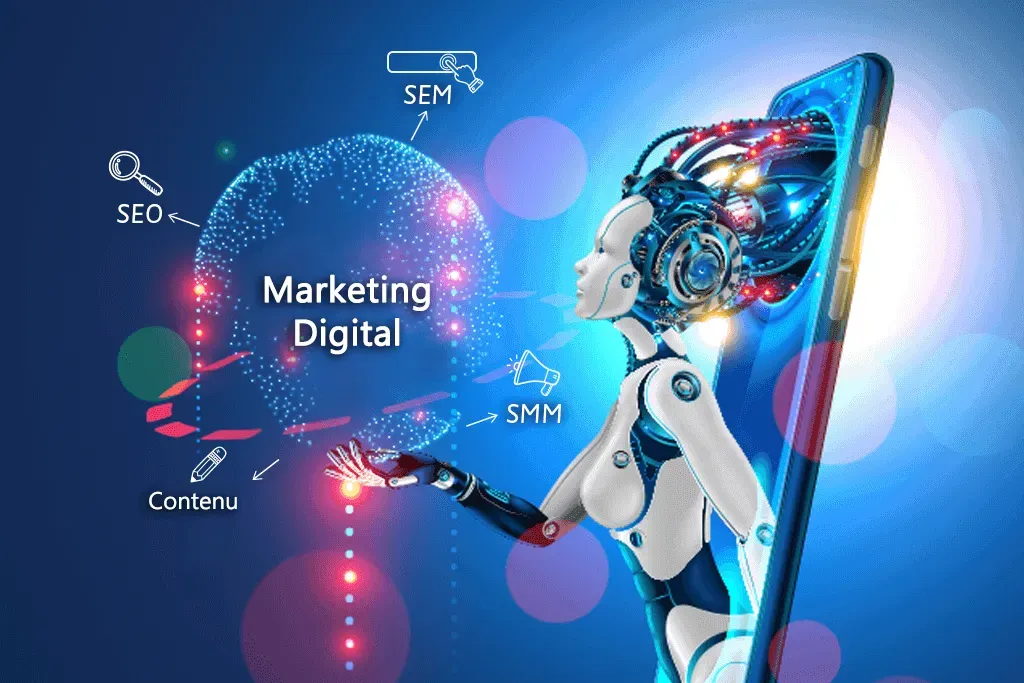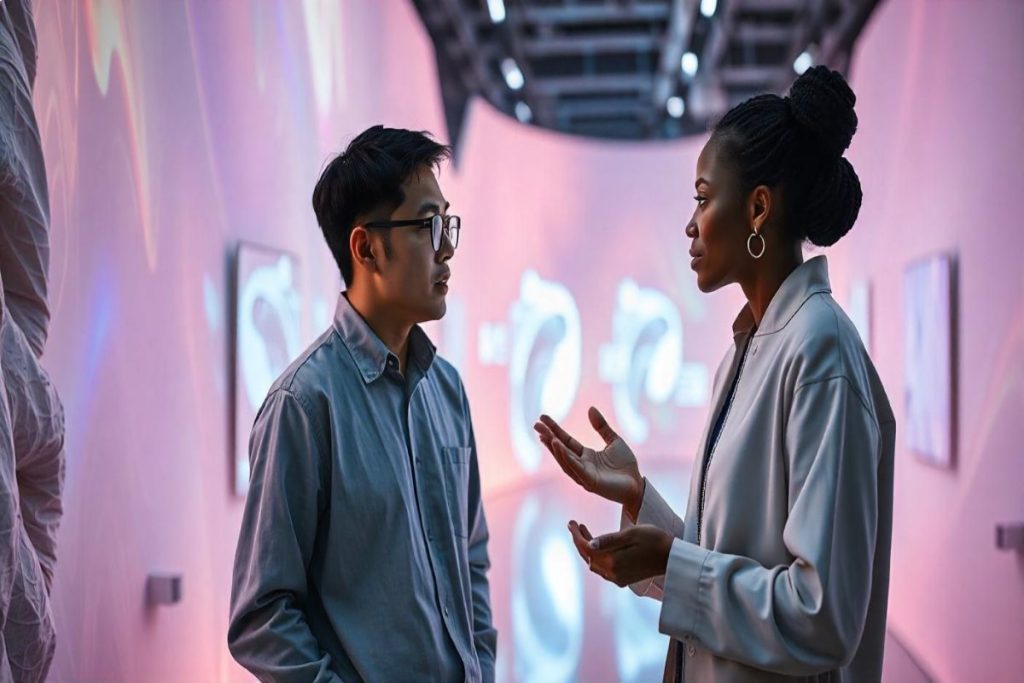Artificial Intelligence in Advertising is rapidly transforming the marketing landscape, reshaping how brands communicate with consumers. With AI marketing tools, companies can create highly personalized commercials that resonate with viewers on a deeper emotional level. The impact of AI is evident as businesses leverage advanced data analytics to understand consumer behavior and preferences like never before. As we navigate the future of work, AI in business is not just streamlining processes, but it is also enhancing creative strategies that were once thought impossible. Advertisements now harness machine learning to predict trends and optimize campaigns, forever changing the face of traditional advertising.
In the realm of commercial promotion, the integration of machine intelligence into marketing practices has become a game-changer. These innovative techniques allow brands to craft tailored ad experiences that speak directly to individual consumer needs. The influence of smart technology on marketing strategies is undeniable, facilitating a deeper understanding of audience dynamics and enhancing the overall effectiveness of promotional efforts. As we look towards the evolving employment landscape, the utilization of automated tools in commercial endeavors is redefining traditional roles. The synergy between creative ad campaigns and cutting-edge AI insights is paving the way for unprecedented engagement and brand loyalty.
The Rise of AI in Commercials
Over the past few years, the advertising landscape has rapidly transformed with the emergence of artificial intelligence (AI) technologies. Companies are now leveraging AI in commercials to present a future where human effort is minimized, and machines handle cognitive tasks like thinking, writing, and even decision-making. This trend reflects a growing acceptance of AI marketing, where brands create narratives suggesting that reliance on AI can lead to a more stress-free lifestyle. Such ads often evoke a sense of liberation from mundane responsibilities, enticing consumers with the promise of enhanced productivity and efficiency.
However, the portrayal of AI in these commercials raises pertinent questions about the societal implications of diminishing human intellect in favor of automated solutions. By showcasing scenarios where AI seamlessly integrates into daily tasks, advertisers not only highlight the benefits of AI in business but also subtly hint at a future where human cognition is undervalued. As audiences are repeatedly exposed to these messages, it’s essential to consider the potential impact of AI on critical thinking and problem-solving skills, suggesting a shift in what it means to be a productive member of society.
Impact of AI on Human Cognition
The increasing reliance on AI technologies in both marketing and everyday life poses a significant challenge to human cognition. As AI tools become integrated into our daily routines, such as through smart assistants and automated note-taking apps, there is a risk that fundamental skills like reading comprehension and critical thinking may deteriorate over time. This situation raises concerns about whether future generations will possess the cognitive abilities required to navigate complex situations independently, resulting in a potential shift in human intelligence as we know it.
Moreover, the normalization of AI in decision-making processes can lead to an over-reliance on technology, fostering a culture where intellectual engagement is sidelined in favor of convenience. Many commercials today idealize scenarios where individuals, like the character Lance, avoid mental labor through the use of AI, which may inadvertently communicate that cognitive tasks are burdensome and better left to machines. Such messaging could impact future workplace dynamics and the overall perception of the value of human skill sets, raising alarms about the diminishing role of thought in our jobs and lives.
AI Commercials and Cultural Narratives
Commercials that showcase AI often construct cultural narratives that can either empower or disempower the viewer. By depicting relatable characters who triumph through the use of AI tools, advertisers harness the aspirational qualities of technology, inviting consumers to envision a reimagined lifestyle where cognitive tasks become effortless. These narratives resonate with audiences, particularly in an era marked by information overload and the high demands of work-life balance. However, they also bear the weight of promoting a mindset that inherently undervalues critical engagement and the joy of intellectual challenge.
Additionally, these narratives can perpetuate stereotypes, as seen in many advertisements featuring individuals who rely heavily on AI to navigate their professional obligations. These portrayals can unwittingly send a message that certain demographics—such as middle managers or office workers—are incapable of performing basic cognitive functions independently. As we consume these commercials, it becomes crucial to question what narratives about human capability and endeavor are being reinforced, as they shape our collective understanding of productivity and intelligence in the age of AI.
Future of Work with AI Solutions
As AI technology continues to evolve, it promises to reshape the future of work in unprecedented ways. Advertisements highlighting AI solutions often emphasize the potential for enhanced efficiency and reduced workloads, suggesting that employees can focus on higher-level strategic tasks while leaving mundane responsibilities to machines. This vision paints a bright picture of the workplace, but it simultaneously raises concerns about job displacement and the potential erosion of roles that require human creativity and emotional intelligence.
Moreover, this shift creates a paradox where, while AI may streamline certain processes, it also necessitates a workforce adept in working alongside AI systems. The future of work, as posed by these commercials, hints at a need for adaptability and the continuous re-skilling of the workforce. As companies increasingly integrate AI into their operational frameworks, the distinction between human skills and machine efficiency will become more blurred, calling for a new understanding of what it means to possess valuable skills in an AI-driven economy.
AI Ethics and Commercial Representation
The representation of artificial intelligence in commercials often glosses over deeper ethical considerations associated with AI integration in society. These advertisements, while entertaining, can obscure critical debates around data privacy, algorithmic bias, and the long-term implications of relying on AI for decision-making. As companies market their AI-driven products, it becomes essential to engage in discussions regarding the ethical frameworks that guide AI development and deployment, recognizing that these narratives come with responsibilities beyond mere consumer engagement.
Furthermore, ethical concerns are compounded by the potential for manipulation in the portrayal of AI in advertising. By presenting a sanitized view of AI that does not address the societal discrepancies it might exacerbate, marketers risk creating a false sense of security regarding the widespread adoption of these technologies. Understanding the ethical implications of AI in commercials allows consumers and businesses alike to engage more critically with the narratives being presented and advocate for responsible AI practices that uphold human dignity and equity.
AI Optimizing Marketing Strategies
The integration of artificial intelligence into marketing strategies has revolutionized how companies reach and engage with consumers. AI algorithms enable businesses to analyze vast amounts of data, allowing for precision targeting and personalized advertising that resonate with individual preferences. This transformative potential of AI in marketing aligns with the optimization of business strategies, making it easier for brands to connect with their audience in meaningful ways, ultimately leading to higher conversion rates.
Moreover, as marketing increasingly relies on AI to craft compelling narratives and manage campaigns, businesses can streamline their processes, reducing costs and enhancing overall efficiency. By automating routine marketing tasks, such as A/B testing and customer segmentation, organizations can allocate resources toward more strategic initiatives that foster creativity and innovation. However, while AI optimizes marketing efforts, it also challenges marketers to maintain authenticity and genuine connections with consumers, ensuring that technological advancement does not overshadow the human element in advertising.
Consumer Response to AI Advertisements
Consumer response to advertisements featuring artificial intelligence tends to be mixed. On one hand, many viewers appreciate the convenience and ease of use that AI promises, resonating with the notion of a future where cognitive burdens are alleviated. On the other hand, there is a growing skepticism regarding the implications of such dependence on technology. As consumers become more aware of the complexities surrounding AI, including its potential role in perpetuating stereotypes and automating critical thought, they may develop a more discerning approach to AI in marketing.
This duality in consumer reactions poses a challenge for marketers as they strive to balance the allure of AI potential with the necessity of responsible messaging. Understanding how consumers perceive AI not only influences ad effectiveness but also shapes brand reputation and trust among audiences. Companies must consider the ethical dimensions of their AI marketing strategies, cultivating transparency and accountability to navigate the intricacies of a digitally-driven marketplace.
Reimagining Education in the Age of AI
The rise of artificial intelligence in everyday tasks has implications for education, prompting educators and stakeholders to rethink curricula and teaching methods. As cognitive tasks become more automated through AI, it will be essential to equip future generations with skills that differentiate human intelligence from machine capabilities. This pivot towards emphasizing creativity, critical thinking, and emotional intelligence in educational frameworks will prepare students for a workforce increasingly cohabitated by AI tools.
Moreover, individuals may need to acquire new competencies to ensure they remain relevant in an AI-dominated landscape. Emphasizing lifelong learning and adaptability will be crucial as job requirements evolve alongside technological advancements. By reimagining education in the context of AI integration, society can foster a generation empowered to navigate challenges with ingenuity and resilience, ensuring that the narrative of human capability persists even in an increasingly automated world.
The Emotional Landscape of AI Dependency
The emotional landscape surrounding the increasing dependency on artificial intelligence in everyday life raises significant concerns about human connection and experience. As individuals rely more on AI technologies to assist with cognitive tasks, they may inadvertently withdraw from interpersonal interactions and genuine emotional engagements. The potential for loneliness and disconnect in a world dominated by machines emerges as a pressing issue that is often overlooked in the optimism surrounding AI’s capabilities.
Additionally, advertisements portraying AI as the solution to daily challenges might inadvertently convey a message that feeling overwhelmed and seeking assistance is a weakness. This stigma can discourage individuals from seeking meaningful relationships and support systems, ultimately isolating them further in their experience of life. It is crucial to acknowledge the emotional nuances of our relationship with technology, encouraging a balanced approach that emphasizes the importance of human connection while embracing the benefits that AI can bring.
Frequently Asked Questions
How is Artificial Intelligence in Advertising transforming marketing strategies?
Artificial Intelligence in Advertising is revolutionizing marketing strategies by enabling more personalized and efficient campaigns. AI algorithms analyze consumer data to predict preferences and behaviors, allowing advertisers to target specific audiences with tailored messages. This technology enhances user engagement, improves return on investment (ROI), and optimizes ad placements in real-time, making AI marketing essential for modern businesses.
What is the impact of AI on traditional advertising methods?
The impact of AI on traditional advertising methods is profound, as it shifts the focus from broad audience targeting to precision marketing. AI tools automate processes such as customer segmentation and ad performance monitoring, reducing reliance on outdated practices. This transition allows advertisers to utilize data insights for dynamic campaigns, ultimately leading to more effective AI commercials that resonate with consumers.
What are the ethical concerns regarding the future of AI in business advertising?
As AI becomes increasingly integrated into business advertising, ethical concerns arise, particularly regarding consumer privacy and data security. The use of AI to track user behavior can lead to manipulative advertising practices. Furthermore, the implications of machine-generated content raise questions about authenticity and transparency in marketing. It is crucial for businesses to maintain ethical standards while harnessing AI marketing tools.
How does AI in business enhance customer engagement?
AI in business enhances customer engagement by providing personalized experiences through predictive analytics. By understanding customer preferences and behaviors, businesses can tailor their advertising efforts and deliver relevant content, leading to higher engagement rates. Interactive AI-driven ads can also create immersive experiences, capturing the audience’s attention and fostering stronger brand loyalty.
What does the future of work look like with the rise of AI in Advertising?
The future of work with the rise of AI in Advertising suggests a shift towards more strategic roles for human workers. As AI automates routine tasks, professionals will increasingly focus on creative and analytical functions that machines cannot replicate. This transformation highlights the importance of human intuition, storytelling, and emotional connection in marketing, ensuring that the human touch remains vital even in an AI-driven landscape.
| Key Point | Description |
|---|---|
| AI Commercials | Recent advertisements highlight how AI is marketed as a way to reduce cognitive burdens on users. |
| Character Analysis | The character ‘Lance’ represents the modern worker who relies heavily on AI for tasks traditionally requiring thought and comprehension. |
| Impact on Society | The reliance on AI in workplaces raises concerns about diminishing intellectual engagement and the role of human workers. |
| Cultural Reflection | The narrative reflects a cultural shift where deep thought and reading are seen as burdensome rather than valuable skills. |
| Future Implications | As AI technology evolves, there’s a risk that human skills could be undervalued or rendered obsolete. |
Summary
Artificial Intelligence in Advertising has become a significant trend, depicting a future where cognitive labor is minimized in favor of technological convenience. These ads suggest that AI can take over thinking and reasoning tasks, positioning it as a liberating force. However, this reliance on technology raises deeper questions about the value of human intellect and creativity. The portrayal of characters like ‘Lance’, who epitomize the modern worker dependent on AI, prompts audiences to reflect on the implications of such a lifestyle. As companies continue to promote AI tools, the ongoing challenge will be to balance efficiency with the essential human need for intellectual engagement.



